Blank Generation fiction is a term applied to a range of American post-punk or transgressive fiction writers of the 1970s and 1980s, first applied by Elizabeth Young and Graham Cavaney in their 1992 study Shopping in Space: Essays on American 'Blank Generation' Fiction (Serpent's Tail, UK/US). The name stems from Richard Hell's signature Blank Generation album and title track (itself a riff on and dismissive of the Beat Generation)
At its broadest, the authors considered American Brat Pack writers such as Bret Easton Ellis, Jay McInerney and Tama Janowitz as belonging to the milieu, as well as Gary Indiana and A. M. Homes. However, the term (which the authors agreed to be problematic) is most accurately applied to the New York writers Kathy Acker, Bruce Benderson, Dennis Cooper, Joel Rose and Hell himself, all of whom featured in the magazine Between C & D . This directly influenced the writing on publications such as Rebel Inc.
The milieu was discussed in-depth in Brandon Stosuy's Up Is Up, But So Is Down: New York's Downtown Literary Scene, 1974–1992 (NYU Press) in 2006.

The Cthulhu Mythos is a mythopoeia and a shared fictional universe, originating in the works of American horror writer H. P. Lovecraft. The term was coined by August Derleth, a contemporary correspondent and protégé of Lovecraft, to identify the settings, tropes, and lore that were employed by Lovecraft and his literary successors. The name Cthulhu derives from the central creature in Lovecraft's seminal short story "The Call of Cthulhu", first published in the pulp magazine Weird Tales in 1928.
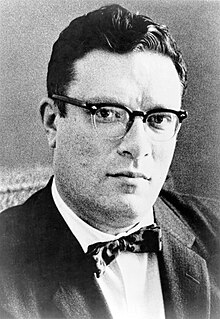
Isaac Asimov was an American writer and professor of biochemistry at Boston University. During his lifetime, Asimov was considered one of the "Big Three" science fiction writers, along with Robert A. Heinlein and Arthur C. Clarke. A prolific writer, he wrote or edited more than 500 books. He also wrote an estimated 90,000 letters and postcards. Best known for his hard science fiction, Asimov also wrote mysteries and fantasy, as well as much nonfiction.

Richard Lester Meyers, better known by his stage name Richard Hell, is an American singer, songwriter, bass guitarist and writer.

Science fiction is a genre of speculative fiction which typically deals with imaginative and futuristic concepts such as advanced science and technology, space exploration, time travel, parallel universes, and extraterrestrial life. It has been called the "literature of ideas", and it often explores the potential consequences of scientific, social, and technological innovations.
The New Wave was a movement in science fiction produced in the 1960s and 1970s and characterized by a high degree of experimentation in both form and content, a "literary" or artistic sensibility, and a focus on "soft" as opposed to hard science. New Wave writers often saw themselves as part of the modernist tradition in fiction, and the New Wave was conceived as a deliberate break from the traditions of pulp science fiction (SF), which many of the New Wave writers involved considered irrelevant and unambitious. The New Wave science fiction writers of the 1960s thus emphasized stylistic experimentation and literary merit over the scientific accuracy or prediction of hard science fiction writers.
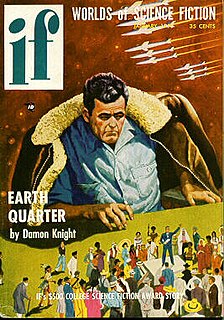
Damon Francis Knight was an American science fiction author, editor and critic. He is the author of "To Serve Man", a 1950 short story adapted for The Twilight Zone. He was married to fellow writer Kate Wilhelm.

Scientific romance is an archaic, mainly British term for the genre of fiction now commonly known as science fiction. The term originated in the 1850s to describe both fiction and elements of scientific writing, but it has since come to refer to the science fiction of the late nineteenth and early twentieth centuries, primarily that of Jules Verne, H. G. Wells and Arthur Conan Doyle. In recent years the term has come to be applied to science fiction written in a deliberately anachronistic style as a homage to or pastiche of the original scientific romances.
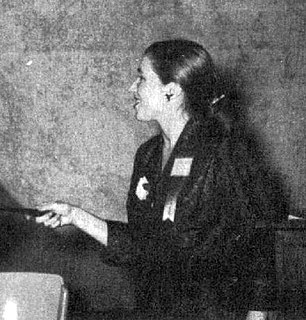
Julian Clare May was an American science fiction, fantasy, horror, science and children's writer who also used several literary pseudonyms. She was best known for her Saga of Pliocene Exile and Galactic Milieu Series books.
Dafydd ab Hugh is an author whose novelette, "The Coon Rolled Down and Ruptured His Larinks, A Squeezed Novel by Mr. Skunk" in Asimov's Science Fiction, was nominated for a Nebula Award in 1990. Simon & Schuster has published eleven ab Hugh novels in the Doom and Star Trek franchises:
Postmodern literature is a form of literature that is characterized by the use of metafiction, unreliable narration, self-reflexivity, intertextuality, and which often thematizes both historical and political issues. This style of experimental literature emerged strongly in the United States in the 1960s through the writings of authors such as Kurt Vonnegut, Thomas Pynchon, William Gaddis, Philip K. Dick, Kathy Acker, and John Barth. Postmodernists often challenge authorities, which has been seen as a symptom of the fact that this style of literature first emerged in the context of political tendencies in the 1960s. This inspiration is, among other things, seen through how postmodern literature is highly self-reflexive about the political issues it speaks to.
Chick lit was a term widely used in the 1990s and early 2000s to describe popular fiction targeted at younger women. Though still in common usage, the term's popularity has declined since the late 2000s: it has fallen out of fashion with publishers while writers and critics have rejected its inherent sexism.
Elizabeth Jesse Young was a London-based literary critic and author, who wrote principally on cult writers for a range of British newspapers and magazines. In particular she championed transgressive fiction, for which she received some criticism in the press, not least for her defence of A. M. Homes' The End of Alice, which dealt with themes of paedophilia from what was seen as an uncomfortably neutral perspective.
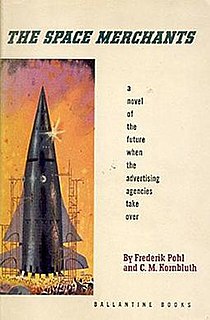
The Space Merchants is a 1952 science fiction novel by American writers Frederik Pohl and Cyril M. Kornbluth. Originally published in Galaxy Science Fiction magazine as a serial entitled Gravy Planet, the novel was first published as a single volume in 1953, and has sold heavily since. It deals satirically with a hyper-developed consumerism, seen through the eyes of an advertising executive. In 1984, Pohl published a sequel, The Merchants' War. In 2012, it was included in the Library of America omnibus American Science Fiction: Four Classic Novels 1953–1956. Pohl revised the original novel in 2011 with added material and more contemporary references.
A fix-up is a novel created from several short fiction stories that may or may not have been initially related or previously published. The stories may be edited for consistency, and sometimes new connecting material, such as a frame story or other interstitial narration, is written for the new work. The term was coined by the science fiction writer A. E. van Vogt, who published several fix-ups of his own, including The Voyage of the Space Beagle, but the practice exists outside of science fiction: The use of the term in science fiction criticism was popularised by the first (1979) edition of The Encyclopedia of Science Fiction, edited by Peter Nicholls, which credited van Vogt with the creation of the term. The name “fix-up” comes from the changes that the author needs to make in the original texts, to make them fit together as though they were a novel. Foreshadowing of events from the later stories may be jammed into an early chapter of the fix-up, and character development may be interleaved throughout the book. Contradictions and inconsistencies between episodes are usually worked out.
Serpent's Tail is a British independent publishing firm founded in 1986 by Pete Ayrton. It is known for publishing works in translation, particularly European crime fiction, and is the British publisher of Elfriede Jelinek and Lionel Shriver. In January 2007 it was bought out by British publisher Profile Books.

Black science fiction or black speculative fiction is an umbrella term that covers a variety of activities within the science fiction, fantasy, and horror genres where people of the African diaspora take part or are depicted. Some of its defining characteristics include a critique of the social structures leading to black oppression paired with an investment in social change. Black science fiction is "fed by technology but not led by it." This means that black science fiction often explores with human engagement with technology instead of technology as an innate good.

Grunge lit is an Australian literary genre usually applied to fictional or semi-autobiographical writing concerned with dissatisfied and disenfranchised young people living in suburban or inner-city surroundings, or in "in-between" spaces that fall into neither category. It was typically written by "new, young authors" who examined "gritty, dirty, real existences", of lower-income young people, whose egocentric or narcissistic lives revolve around a nihilistic or "slacker" pursuit of casual sex, recreational drug use and alcohol, which are used to escape boredom. The marginalized characters are able to stay in these "in-between" settings and deal with their "abject bodies". Grunge lit has been described as both a sub-set of dirty realism and an offshoot of Generation X literature. The term "grunge" is a reference to the US rock music genre of grunge.
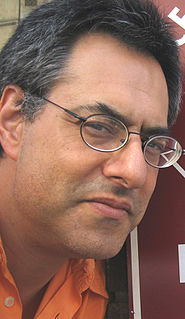
Mitch Berman is an American fiction writer known for his imaginative range, exploration of characters beyond the margins of society, lush prose style and dark humor.

Space opera is a subgenre of science fiction that emphasizes science fictional space warfare, with use of melodramatic, risk-taking space adventures and chivalric romance. Set mainly or entirely in outer space, it features technological and social advancements in faster-than-light travel, futuristic weapons, and sophisticated technology, on a backdrop of galactic empires and interstellar wars with fictional aliens, often in fictional galaxies. The term has no relation to music, as in a traditional opera, but is instead a play on the terms "soap opera", a melodramatic television series, and "horse opera", which was coined during the 1930s to indicate a clichéd and formulaic Western movie. Space operas emerged in the 1930s and continue to be produced in literature, film, comics, television, and video games.
Carla Blank is an American writer, editor, educator, choreographer, and dramaturge. Based in the San Francisco Bay Area, for more than four decades she has been a performer, director, and teacher of dance and theater, particularly involved with youth and community arts projects.